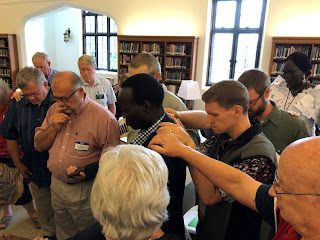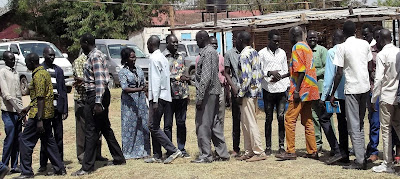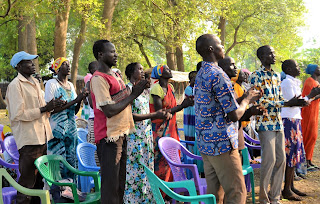How can I repay the Lord for all his goodness to me? Psalm 116:10
At the end of November we finished our visits to churches for this year. We reflected on all the ways God has encouraged and blessed us as we have traveled around this year, reconnecting with so many of you who partner with us. We are truly grateful to God and to all the people we encountered along the way. `Here are a few pictures and specific highlights of things we are grateful for in this season:
1. Safe travel…about 10,000 road miles logged and a few flights. We prayed extra hard on the curves and hills of West Virginia in the driving rain!
2. All the people who expressed an interest in South Sudan and the work of the church there – who asked probing questions and wanted to learn more.
3. Conferences (like New Wilmington Mission Conference, Big Tent, and the Sudan/South Sudan Mission Network), where we reconnected with lots of people we know and had a chance to share more in-depth about our work in South Sudan.
4. Hospitality – Many people hosted us for the night or for a meal, drove us somewhere or loaned us a car. We appreciate the generosity, and also the connections and conversations those opportunities provided.
5. The gift of reconnecting with friends and families. Seeing people face to face feels so special when it is so rarely possible for us. Relationships that have spanned many years are so refreshing to pick back up on!
6. Answered prayers when we were nervous before speaking, or trying to figure out how to best use the time given us to share.
7. Recovery time – Bob experienced more physical pain with his broken hip than he has ever experienced, and it forced us to cancel lots of plans. We are very grateful for healing and for the time of recovery; we feel like God redeemed the cancelled and rescheduled plans.
8. Good reports from our colleagues in South Sudan. The media team at NTC produced a newsletter without Bob’s monitoring and assistance, and Kristi’s colleagues facilitated a healing and reconciliation workshop in July. The church continues to have a significant role in pushing for peace, and we look forward to returning in July.
9. The seasons! We watched extra-closely this year the leaves changing colors as autumn progressed, noticing deeper colors as we traveled north. Sometimes we just stared in awe at the rainbow of colors in the trees. Of course, a picture can never do it justice! We watched an early winter blizzard in Oregon, and look forward to a little more snow this year.
10. Exploring new places – we had some short-but-sweet days of savoring the beauty and uniqueness of some places we had not visited before – like the Indiana Dunes National Park, a mountain-top monastery in Portland, the shores of Lake Erie, and Madera Canyon in southern Arizona.
Our hearts are full of gratitude – to you, and to God, for making this year possible. We have a few more weeks of savoring some time with our families over Christmas, last-minute medical appointments, and packing, and then we return to Juba the first week of January.
At the end of November we finished our visits to churches for this year. We reflected on all the ways God has encouraged and blessed us as we have traveled around this year, reconnecting with so many of you who partner with us. We are truly grateful to God and to all the people we encountered along the way. `Here are a few pictures and specific highlights of things we are grateful for in this season:
1. Safe travel…about 10,000 road miles logged and a few flights. We prayed extra hard on the curves and hills of West Virginia in the driving rain!
2. All the people who expressed an interest in South Sudan and the work of the church there – who asked probing questions and wanted to learn more.
3. Conferences (like New Wilmington Mission Conference, Big Tent, and the Sudan/South Sudan Mission Network), where we reconnected with lots of people we know and had a chance to share more in-depth about our work in South Sudan.
Praying for Rev. Santino, principal of NTC, at the mission network
5. The gift of reconnecting with friends and families. Seeing people face to face feels so special when it is so rarely possible for us. Relationships that have spanned many years are so refreshing to pick back up on!
6. Answered prayers when we were nervous before speaking, or trying to figure out how to best use the time given us to share.
7. Recovery time – Bob experienced more physical pain with his broken hip than he has ever experienced, and it forced us to cancel lots of plans. We are very grateful for healing and for the time of recovery; we feel like God redeemed the cancelled and rescheduled plans.
8. Good reports from our colleagues in South Sudan. The media team at NTC produced a newsletter without Bob’s monitoring and assistance, and Kristi’s colleagues facilitated a healing and reconciliation workshop in July. The church continues to have a significant role in pushing for peace, and we look forward to returning in July.
9. The seasons! We watched extra-closely this year the leaves changing colors as autumn progressed, noticing deeper colors as we traveled north. Sometimes we just stared in awe at the rainbow of colors in the trees. Of course, a picture can never do it justice! We watched an early winter blizzard in Oregon, and look forward to a little more snow this year.
10. Exploring new places – we had some short-but-sweet days of savoring the beauty and uniqueness of some places we had not visited before – like the Indiana Dunes National Park, a mountain-top monastery in Portland, the shores of Lake Erie, and Madera Canyon in southern Arizona.
Our hearts are full of gratitude – to you, and to God, for making this year possible. We have a few more weeks of savoring some time with our families over Christmas, last-minute medical appointments, and packing, and then we return to Juba the first week of January.


















































